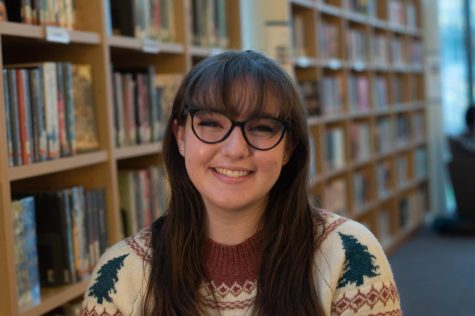Q&A: Ms. Hanley Answers Your Questions on the “Changing Landscape” of College Admissions
“My whole thing is I am here for the students,” college counselor Ms. Maddie Hanley said. “So anyone who wants to talk about colleges and help build a list, they can start doing that freshman year too.”
January 5, 2022
To learn more about the college application process, The Falconer asked Ms. Hanley for her insight on a few commonly asked questions.
How has the college application process changed since COVID-19?
The most major difference in the college application process since the COVID-19 pandemic began has been that “most schools have gone test-optional,” Ms. Hanley said. However, it is unclear whether or not schools will stick to this in the future.
“I do think the nice part is that there is going to be more of a holistic review process with admissions,” she said. “Your personal statement is going to be looked at more closely.”
Ms. Hanley hopes that the test-optional process will allow schools to get more context about the students that they are choosing to admit. “Colleges are really going to focus on ‘who is this person,’ and not just academics and not just one score,” she said. “They’re going to look at everything that student did in high school — from their classes, to their extracurriculars, to their essays.”
Standardized tests like the SAT and ACT are “not a reflection of your ability or how successful you’re going to be,” Ms. Hanley said. “To me, the tests have always been a barrier for so many students, so I think getting rid of them is a very good thing.”
What are the differences between test-optional, test-blind, and test-required schools?
With test-optional schools, you can send in your score and have it be considered, or if you do not send in a score it will not be looked down upon.
With test-blind schools, if you send in your score from a national test, “they’ll just throw it away,” Ms. Hanley said. It will not be considered in your application no matter what.
Finally, test-required schools consider your score as a part of your application, so it must be submitted and is considered.
“It’s a changing landscape,” Ms. Hanley said, but more schools have been switching to test-optional recently, including Harvard University through the class of 2030. In addition, the University of California system recently announced a permanent move to test-blind admissions.
What advice do you have for students who are writing essays for their schools?
When it comes to your essays for college, Ms. Hanley said that it is important that your essay sounds like you, and that nobody else wrote it for you or heavily edited it.
“Colleges just really want to see how you think and what you’re passionate and interested about,” Ms. Hanley said. “They want to see your creativity.”
She also emphasized that it is important to take your time with your essay. “Colleges can tell if you knock it out in one day,” she said.
One common struggle that Ms. Hanley sees with students is deciding what to write about, but figuring this out is “one of my favorite parts,” she said. One exercise she asks students to do in order to brainstorm ideas is to look around their room and choose three items to take with them to college — and then tell her about them to build upon the stories behind the items.
How does the Common App work with SCOIR at La Salle?
La Salle uses both the Common App and SCOIR for the college application process. The most confusing element of this, according to Ms. Hanley, is that both programs have a space to request letters of recommendation. Students may think that they need to submit their requests for letters of recommendation on both platforms, but this is not the case.
On the Common App, students are only supposed to input their recommender’s name, but not their email address. Their email address, and ultimately their letter of recommendation, go into SCOIR.
“It is legitimately confusing,” Ms. Hanley said, which is why in the future she hopes to make this distinction more clear. She has been taking notes on what works and does not work in order to improve La Salle’s usage of both systems.
Can students who do not plan on attending college still work with Ms. Hanley?
In short, yes — students who do not plan on attending college can still talk with Ms. Hanley about their future.
“It’s totally okay to be like, ‘I’m not sure I’m ready for college yet,’” Ms. Hanley said. One option she recommends for students who feel like this is to just take their core courses at a community college.
Another option is to take a gap year, where students will often work instead of taking classes. “Colleges do not look down on gap years, as long as you kind of have a plan,” Ms. Hanley said.
But if neither of those options are appealing to a student, “college isn’t for everybody, and I think that’s totally okay,” Ms. Hanley said. “I don’t want those students to feel isolated because they’re taking a different path… Everyone gets to where they need to get.”
How can underclassmen prepare for the college application process?
Ms. Hanley’s first piece of advice for underclassmen is to “work hard in school,” but she also emphasizes that “high school is a great time to explore, you know, what you’re truly interested in.”
She encourages students to try a variety of clubs, and “take advantage of all the opportunities you have in high school to explore all these different areas.”
How can juniors prepare for the college application process?
“I’m super excited to work with the juniors and just help them in more self-reflection,” Ms. Hanley said. “Junior year is, you know, the toughest year academically,” so she encourages students to “really try to work really hard your junior year to maintain those grades.”
She also urges students to consider what their “personal fit” for a school is. This includes a school’s environment, location, academic fit, financial fit, and more. “Start building a balanced list junior year and being realistic about it,” she said.
What advice do you have for seniors in the college application process?
First, start with your personal statement, and “don’t wait until the last minute,” Ms. Hanley said. To stay on schedule, she suggests brainstorming topic ideas in the summer before your senior year.
Overall, Ms. Hanley encourages students to “use all the resources at your disposal” when it comes to picking a college to attend. “Your investment in the college selection process is the first way to demonstrate your commitment to your future success,” she said.
To learn more about Ms. Hanley and how she arrived at La Salle, read here.





